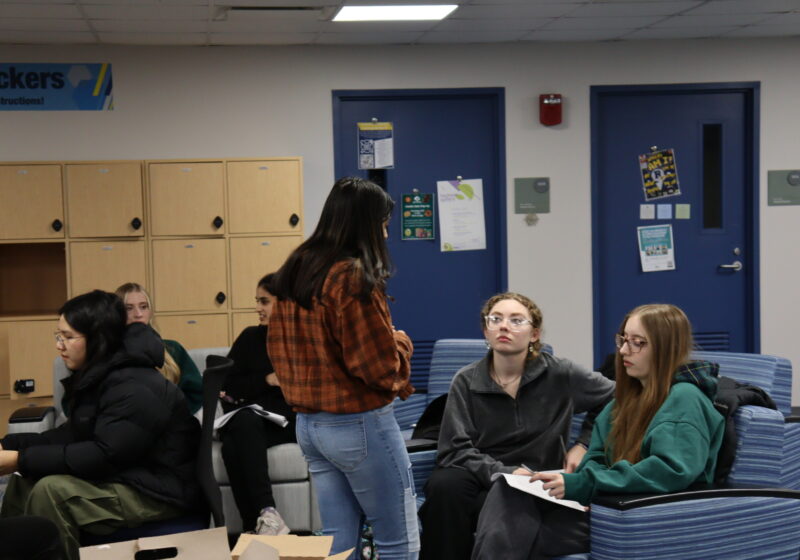Engineers are taking over.
A long-observed but hardly quantifiable phenomenon, known as the engineering superiority complex, has plagued campus since the university’s founding. If you thought the pre-med complex was bad, it really does not compare to this one. Ranting about orgo labs? That’s better than doing engineering. MATH 162 WebWork? At least you don’t have to solve second differential order circuits. Complaining to a friend about your upcoming philosophy paper due? Well, actually, shut up, because listen, they’re an engineer, and they’ve probably spent more hours of their lives on their weekly problem sets than you have sleeping. Conversely, they’ve spent as much time sleeping as you have scrolling on TikTok in one sitting — hopefully (and also hopefully not) more than two hours. That’s the complex in a nutshell.
The CT spoke with the excessively conceited majors themselves to learn more about this phenomenon. Across the University’s five academic programs within the Hajim School of Engineering and Applied Sciences, the students of interest included biomedical (BME), chemical (Chem-E), electrical and computer (ECE), mechanical (Mech-E), and optical (no real campus colloquialism apparently, just “optics”) engineers. Computer science students were not interviewed because they do not qualify as engineers.
The complex, initially thought to be a general sense of superiority over non-engineers, proves to be much more complicated. Within the engineering school, there are evident power trips, namely among the BMEs. Sophomore Bee Emmy, a BME with a Cell & Tissue Concentration, said, “Even though BMEs just basically take a tour of all the other engineering majors, I still feel that our major’s legit,” referring to the BME curriculum, which requires them to take the intro classes for every other engineering major and somehow combine it into one useful degree. Emmy’s concentration in Cell & Tissue means that she takes classes with Chem-Es, while her peers concentrating in Biomechanics join the Mech-Es — most of whom when interviewed regret choosing BME and wish they did Mech-E from the start — while the literal handful of Signals & Systems BMEs split off sadly to group with the ECEs.
Some shots were also fired at the BME optics engineers. Senior Fourier T. Spark, tired of being clowned for choosing BME signals, deflected and instead raised a very legitimate question: “Why would you do BME optics when you can just be an optical engineer?” Unfortunately for Spark, with less than one semester until graduation, he’s also too far along on his major’s pathway to switch, because why would you do BME signals when you can just do ECE?
In the process of stopping strangers on the engineering quad, the CT also mistakenly interviewed some students coming out of Hutch, who appeared to be engineers due to how lifeless and depressed they looked, but were really just pre-meds coming from the morning chem lecture (weaklings). After shifting locations to the entrance to Goergen to filter out pre-meds, a new question came to mind: If a pre-med and an engineer had a fight, who would win? Obviously the engineer… unless they are the same person.
Yes, there are actually engineering pre-meds. The only logical question to ask next would be why on earth a hapless soul would subject themselves to that. Luckily, Goergen was the perfect spot to get some answers. Unfortunately, actually speaking to students of this rare breed was a mistake and directly revealed the absolute worst egotistical combination you can find.
“I know this will sound super narcissistic, but pre-med is just too easy for me. That’s why I’m an engineer. So I can do both,” the deranged student standing in front of me said, as he sipped from a trenta cold brew. The student did not wish to disclose his name, but did disclose that he was a Chem-E, and that he was conducting research in three labs, managing three engineering and pre-med societies, and performing weekly open-heart surgeries on patients at URMC.
Mysteriously, the number of students enrolled in Hajim skyrocketed from last year. The reasons are currently unknown, but the running suspects are the Dunning-Kruger effect (aka reverse imposter syndrome), herd mentality, and a general consensus on why-suffer-less-when-you-can-suffer-more. Whether the incoming class is actually smart or marginally competent is TBA, but hey, they’re engineers.
Truly, in no other department will you find majors as culty, conceited, and attention-seeking as Hajim. The iZone project rooms are swarmed with desperate engineers crowding at office hours; once you see the formulas they write up on the Gleason studio whiteboards — it’s all Greek, where are the numbers? — that should be your red flag to run away while you can. Every single one of them has no real reason to brag except for the flimsy excuse that they are, in fact, an engineer. Still, if you ask any engineer what engineering is, they shouldn’t be able to give you a straight answer. (If they do, they’re not a real engineer.)
Spark agreed. “You never really know what you’re doing in class, honestly,” he said. “You just kind of plug in numbers and hope that in lab the thing doesn’t explode.”







